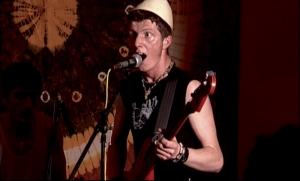
idejaprogramservisengliš |
 |
Shuffle: politics, bullshit and rock’n’roll – Shuffle: politikë , laknurë dhe rokenroll
Regie: Edon Rizvanolli & Ylber Mehmedaliu; 42 Min., Kosovo 2005 (OmU)
Wettbewerb: Golden Black Box Competition
babylon berlin:mitte, Fr, 17.11.2006 um 22:00 Uhr
Brotfabrik Kino, Mi, 22.11.2006 um 18:00 Uhr
babylon berlin:mitte, Do, 23.11.2006 um 19:30 Uhr

1. Preis Asterfilmfest 2006
Publikumspreis Prizren 2005
Five years after the NATO led campaign against Yugoslav Army Troops, one million Kosovars returned to their destroyed homes and begun their daily struggle. Lack of jobs, extreme poverty, political instability, inconsistent electricity and water supply, are some of these problems. While in 1999 people were happy to find freedom, five years later they found themselves disillusioned and angry. Six alternative music bands try to express all of these emotions through music and performance.
“There have not been any songs made in Pristina, Kosova for a long time. Music yes, but not songs. I am not saying that songs are more important than music, but songs are very much needed by a society.” Genc, Kosovar Musician
Shuffle takes place in postwar Kosova. It tells the story of six struggling alternative bands
and their view on politics, religion and their daily life.
Musicians making alternative music have it difficult all over the world and so do members of these bands. What sets these bands apart from similar bands in other countries of western Europe or the US is the lack of audience and customers interested in their work.
The highest amount of CD’s which these bands ever sold is between 2.000 and 3.000.
While Kosova has one of the youngest population in Europe (65% are under the age of 27) these youngsters do not seem very interested in different music other than mainstream.
“After the War, allot of Turbo Folk Musicians made business based on other peoples blood. They made music about people who died for this country and got rich” Dardan, Kosovar Musician
Why does the majority of Kosovars listen to mainstream music? or Turbo Folk, the way it’s called in slang language. This question is another subject that “bothers” the alternative bands and while trying to answer this question they stumble across politics, lack of institutional support, the postwar syndrome and the need of society for nationalistic songs which the Turbo Folk music offers. While some of the musicians in this movie name these Turbo Folk singers evil, others tend to “blame” their own failure on their own lack of professionalism and hard work.
“There was no way in the world we could have ever stopped those riots, by the time we would have set up our instruments, everything went on flames”
Matian, Kosovar Musician
While these musicians struggle like jugglers between survival and art, life goes on in Kosova and things happen, things, which have (un)willingly an impact on their music. Like the March Riots, where 17 Albanians and 3 Serbs got killed. These were the bigest clashes between the Albanians and the Serbs in the last 5 years. These riots are a very painfull subject to all of the musicians, and while they agree that the clashes should have not taken place, they seem not to agree on why they happened. Did the politicians fail? Was it the UN? The lack of jobs? The unsolved political status? Or was it all of the above
reasons combined together? Can an alternative music band with 2.000 sold CD’s have such an influence on society as to stop ongoing riots?
While this movie shuffles from one band to the other and from one question to the next one, it shows the differences and similiarities between these six bands, whose music ranges from rebellious punk to lyrical pop.
This shuffling between subjects and bands gives the viewer a chance to get to know a small part of the Kosovar social puzzle.
